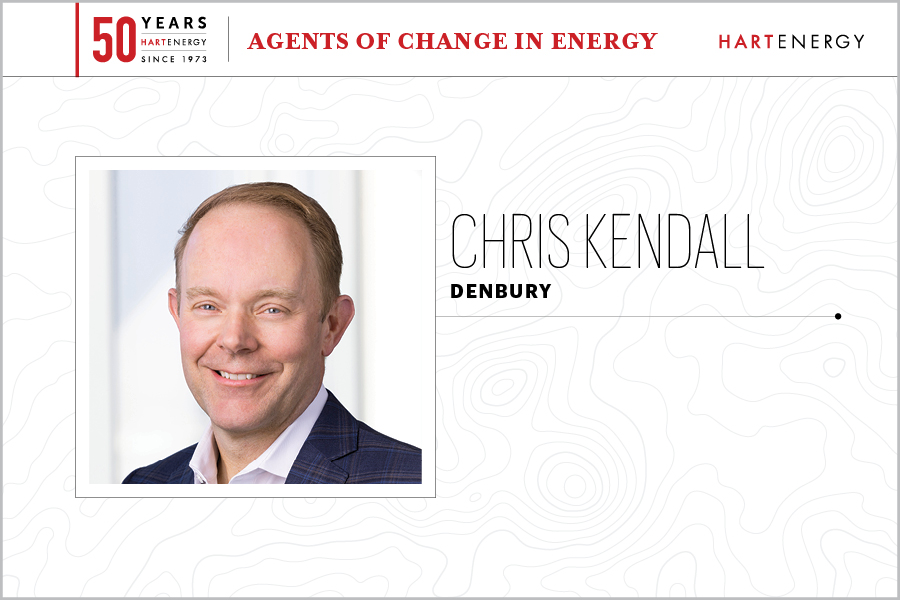Chris Kendall
Editor's note: This profile is part of Hart Energy's 50th anniversary Hall of Fame series honoring industry pioneers of the past 50 years and the Agents of Change (ACEs) who are leading the energy sector into the future.

Chris Kendall did not originally intend to be part of the energy business; now, the CEO of carbon solutions company Denbury can’t imagine being part of anything else.
A civil engineer by training, his first job out of college took him to South Louisiana, where offshore structures in the Gulf of Mexico reeled him into the oil and gas business. After beginning his career at Mobil Oil, he served in various international and U.S. leadership roles with Noble Energy before landing at Denbury.
“Denbury was not in a great position at that time, [but] I could see a pathway to where Denbury could lead in doing everything needed to put carbon dioxide underground and be part of the solution in a world that is continuing to grow its CO2 emissions,” Kendall told Hart Energy.
The company of about 800 employees has carved out a niche as a leader in the carbon capture, utilization and storage space and CO2 recycler via its enhanced oil recovery operations. Its assets and capabilities captured the attention of Exxon Mobil, which agreed in July 2023 to acquire Denbury in an all-stock deal valued at about $4.9 billion—a move that gives it access to the largest network of CO2 pipelines in the U.S.
“We are moving 4 million tons a year of captured CO2 underground permanently. Today, that’s happening in enhanced oil recovery, which is on its own a fantastic story because of the low-carbon footprint that that barrel of oil has,” Kendall said. “But in the future, it will go well beyond that. We’ll be putting CO2 into saline aquifers that will just go into permanent storage in vast quantities, and we’ll use the same expertise and tools and assets that we have as a company to do that.”
Denbury’s accomplishments to date are the highlight of Kendall’s career, he said, speaking about being part of a business where the future is visible.
“We can actually make a difference in carbon emissions. This is a company that is literally built to do that,” he said.
Doing something with meaning and making a difference in the world is what motivates him to keep moving—that and making sure the company is doing right by its employees, giving them a place as well to do work with meaning and purpose.
The energy industry has an amazing opportunity to make a difference in the world, including by making affordable energy available in developing countries, Kendall added. He thinks about millions of people who die each year from respiratory illnesses associated with cooking indoors with coal, wood or animal dung.
“That could be solved so easily if we could find a way of getting propane gas just like you have in your grill distributed more readily and, and broadly across so many of these developing nations,” Kendall said.
Like others, he sees providing reliable, affordable energy while addressing climate change is the biggest challenge facing the industry today.
“We have to reduce emissions, but we also have to make sure that the people can receive the energy they need,” Kendall said. “That’s why I believe so strongly in CCUS as a huge part of that solution.”
Kendall wants others in the industry to know that the oil and gas business has developed the tools needed to grow the CCUS industry. Think of the ability to drill oil and gas wells, and similar skills honed to drill wells for CO2 injection. The same holds true for pipelines, which move oil, natural gas or CO2; and scientists who model and monitor the movement of fluids deep underground.
“We use those same skills for CCUS. So, we have this. We don’t have to go create something new here,” Kendall said. “We have everything that we need within this industry to allow it to do much more than it’s doing today.”
Becoming part of Exxon Mobil, a company with identical views on CCUS plus deep expertise and a large balance sheet, would enable Denbury to do more than it would be able to do on its own, he added. “I just see it as a case where one plus one is something much greater than two.”
—Velda Addison, Senior Editor, Energy Transition
